For the 2025 school year, there are 2 public elementary schools serving 819 students in Wabash City Schools School District. This district's average elementary testing ranking is 3/10, which is in the bottom 50% of public elementary schools in Indiana.
Public Elementary Schools in Wabash City Schools School District have an average math proficiency score of 19% (versus the Indiana public elementary school average of 40%), and reading proficiency score of 32% (versus the 40% statewide average).
Minority enrollment is 14% of the student body (majority Hispanic), which is less than the Indiana public elementary school average of 37% (majority Hispanic and Black).
Overview
This School District
This State (IN)
# Schools
4 Schools
1,435 Schools
# Students
1,517 Students
659,801 Students
# Teachers
94 Teachers
43,989 Teachers
Student : Teacher Ratio
16:1
16:1
District Rank
Wabash City Schools School District, which is ranked within the bottom 50% of all 394 school districts in Indiana (based off of combined math and reading proficiency testing data) for the 2021-2022 school year.
The school district's graduation rate of 90-94% has increased from 85-89% over five school years.
Overall District Rank
#290 out of 400 school districts
(Bottom 50%)
(Bottom 50%)
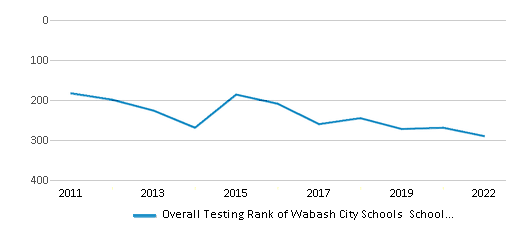
Math Test Scores (% Proficient)
20%
38%
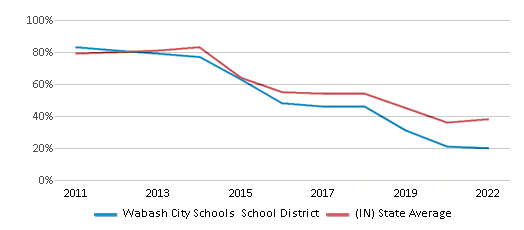
Reading/Language Arts Test Scores (% Proficient)
34%
41%
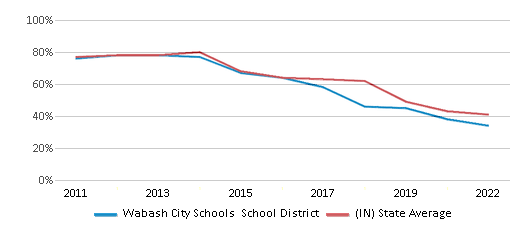
Science Test Scores (% Proficient)
26%
34%
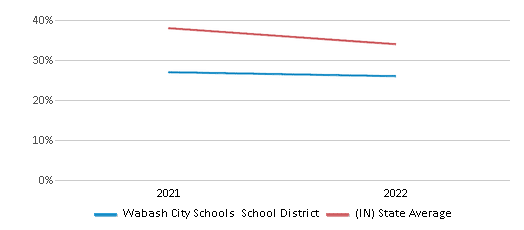
Graduation Rate
90-94%
88%
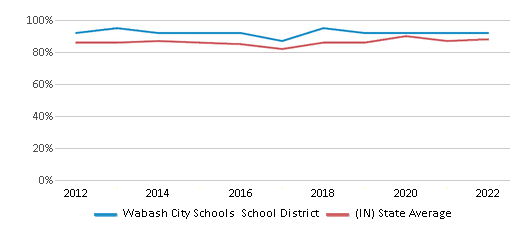
Students by Ethnicity:
Diversity Score
0.23
0.56
# American Indian Students
10 Students
1,032 Students
% American Indian Students
1%
n/a
# Asian Students
10 Students
19,662 Students
% Asian Students
1%
3%
# Hispanic Students
88 Students
93,041 Students
% Hispanic Students
6%
14%
# Black Students
9 Students
88,296 Students
% Black Students
n/a
13%
# White Students
1,330 Students
418,549 Students
% White Students
88%
64%
# Hawaiian Students
n/a
755 Students
% Hawaiian Students
n/a
n/a
# Two or more races Students
70 Students
38,466 Students
% of Two or more races Students
4%
6%
Students by Grade:
# Students in PK Grade:
94
19,202
# Students in K Grade:
112
71,414
# Students in 1st Grade:
91
73,920
# Students in 2nd Grade:
104
76,347
# Students in 3rd Grade:
89
74,817
# Students in 4th Grade:
100
76,116
# Students in 5th Grade:
101
74,584
# Students in 6th Grade:
111
76,081
# Students in 7th Grade:
121
46,651
# Students in 8th Grade:
102
47,159
# Students in 9th Grade:
124
5,210
# Students in 10th Grade:
116
5,976
# Students in 11th Grade:
123
6,085
# Students in 12th Grade:
129
6,072
# Ungraded Students:
-
167
District Revenue and Spending
The revenue/student of $11,903 in this school district is less than the state median of $13,214. The school district revenue/student has stayed relatively flat over four school years.
The school district's spending/student of $12,485 is less than the state median of $12,844. The school district spending/student has stayed relatively flat over four school years.
Total Revenue
$18 MM
$13,615 MM
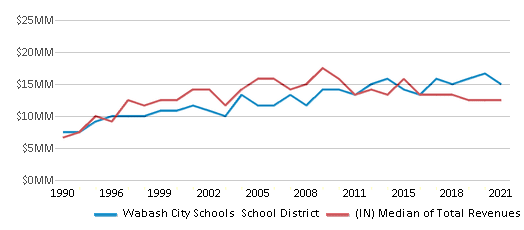
Spending
$19 MM
$13,234 MM
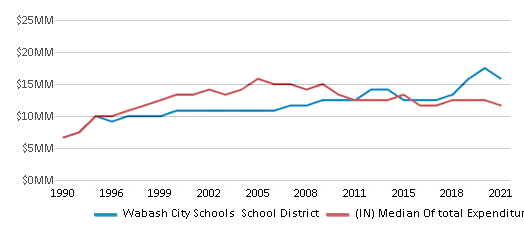
Revenue / Student
$11,903
$13,214
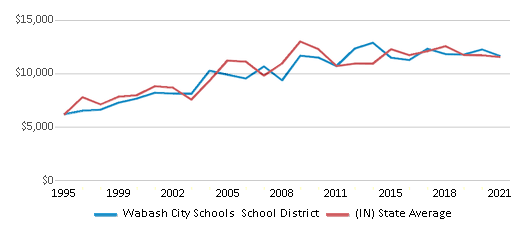
Spending / Student
$12,485
$12,844
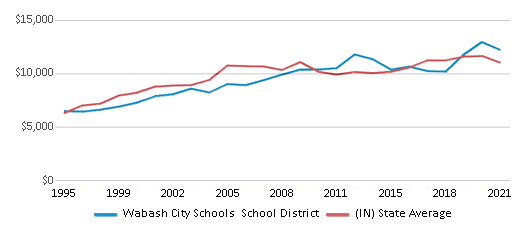
Best Wabash City Schools School District Public Elementary Schools (2025)
School
(Math and Reading Proficiency)
(Math and Reading Proficiency)
Location
Grades
Students
Rank: #11.
Wabash Middle School
(Math: 18% | Reading: 34%)
Rank:
Rank:
3/
Bottom 50%10
150 Colerain St
Wabash, IN 46992
(260) 563-4137
Wabash, IN 46992
(260) 563-4137
Grades: 5-8
| 435 students
Rank: #22.
O J Neighbours Elementary School
(Math: 21% | Reading: 28%)
Rank:
Rank:
3/
Bottom 50%10
1545 N Wabash St
Wabash, IN 46992
(260) 563-2345
Wabash, IN 46992
(260) 563-2345
Grades: PK-4
| 384 students
Recent Articles

What Is A Charter School?
Explore the world of charter schools in this comprehensive guide. Learn about their history, how they operate, and the pros and cons of this educational innovation. Discover key facts about charter schools, including admission policies, demographics, and funding, as well as what to look for when considering a charter school for your child.

10 Reasons Why High School Sports Benefit Students
Discover the 10 compelling reasons why high school sports are beneficial for students. This comprehensive article explores how athletics enhance academic performance, foster personal growth, and develop crucial life skills. From improved fitness and time management to leadership development and community representation, learn why participating in high school sports can be a game-changer for students' overall success and well-being.

February 05, 2025
Understanding the U.S. Department of Education: Structure, Impact, and EvolutionWe explore how the Department of Education shapes American education, from its cabinet-level leadership to its impact on millions of students, written for general audiences seeking clarity on this vital institution.





